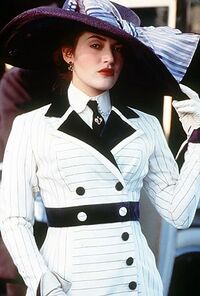National Unity Party (Gylias)
National Unity Party | |
|---|---|
| Founded | 1875 |
| Ideology |
|
| Political position | Centre-left |
| National affiliation | Liberal Union |
| Colours | Gold |
| Website | |
| http://www.nup.gls/ | |
The National Unity Party (French reformed: Parti d'unité nationale), abbreviated NUP (PUN), is a Gylian political party, part of the Liberal Union bloc.
Established in 1875, it is the oldest Gylian party in continuous existence. It has been among the standard-bearers of Gylian liberalism, playing a significant role in the Gylian ascendancy and a central one in the Popular Progressive Front that governed Alscia.
History
The National Unity Party was founded in 1875, during the Gylian ascendancy. It was initially intended as an umbrella organisation for the constitutionalist faction of the Gylian resistance. However, its big tent incarnation rapidly fell prey to splinters and sinistrisme, as the centralised party model proved unworkable and was replaced by a more effective political alliance model.
At its founding, it was primarily Gylian nationalist, as reflected in its name, and broadly liberal. Its early classical liberal position gave way to a more interventionist social liberal approach under popular pressure and Xevdenite intransigence.
It participated in two Xevdenite coalition governments led by Raţiáş Keýmer (1890–1897) and Gezy Nemáz (1900–1902). It was banned during the royal dictatorship imposed in 1902, driving it underground for a period. After the Cacerta-Xevden War, it moved its headquarters to Alscia. An internal election before the 1908 general election brought the previously unknown Donatella Rossetti to the leadership, setting the course of party history for decades afterwards.

In Alscia, the NUP became a leading party in the Popular Progressive Front and the Donatella Rossetti government. It became the standard-bearer of Donatellism, placing itself firmly on the centre-left by completing the purge of its classical liberal faction. It stood for a mixture of economic interventionism, social liberalism, and pragmatic reformism that mainly appealed to the FPP's wealthier and Hannaist-leaning electorate.
Having been largely adrift after the loss of its big tent role, it was reshaped according to Donatella's personality and image, becoming strongly personalised.
The "hurried province" became "a jewel in the crown of Gylian liberalism", in the words of historian Herta Schwamen, but beneath the image of undisputed dominance, strong internal competition occurred within the FPP, with liberals gradually losing ground to socialists. Alscia's entrance into the Free Territories bound the party even more to Donatella, whose prestige and status as a leading figure of Gylian liberalism provided stability, at the expense of dislocation by more left-wing forces.
After leading the party to a fifth-place finish in the 1958 federal election, Donatella stepped down after 50 years as leader, the longest tenure for a Tyranian party leader. Since the NUP had come to be identified so strongly as the "Donatella Rossetti party", it initially had trouble bringing new leadership that could match her stature.
It formed an alignment with the National Liberal Party and People's Radical Reformist Alliance, coalition partners in the former FPP, which became the Liberal Union. In the Darnan Cyras government, it was mainly represented by equality minister Clarissa Rossetti, Donatella's daughter, and transport minister Kōichi Nishida.
During the wretched decade, it was part of the LU faction open to reaching an agreement with the Centre Group and National Bloc, against the fierce opposition of the Left Liberal Rally and Freedom and Solidarity Party. The grand coalition only came to fruition after the Ossorian war crisis of 1986, under Filomena Pinheiro.
The NUP returned to a leading coalition role in Mathilde Vieira's "plural coalition", and its leader Kaori Kawashima served as Prime Minister from 2008 to 2012. She reconstructed the alliance with the Progressive Alliance, and the LU subsequently returned to its junior partner role in the Toni Vallas government, before moving to opposition in 2020.
Ideology
The NUP is the main Donatellist party of the LU, whose platform emphasises social liberalism, economic interventionism, progressivism, and civic nationalism. It has often been compared to social democratic parties abroad.
The party remains defined by the figure and career of Donatella Rossetti, to an extent comparable to the Civic National Party molding itself in the image of Hannah Edelstein.
Symbols
The NUP uses the colour gold as its official colour, and the image of Donatella Rossetti as its electoral symbol.